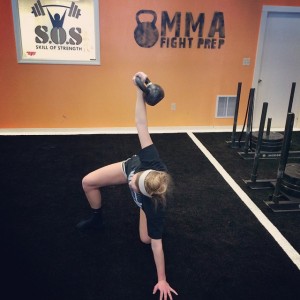Let’s face it, you’re not bragging to your buddies that today is shoulder and hip mobility day in the gym. However, although your mobility work might not be the highlight of your training program, here are some key points that will make you rethink your priorities and spend some time opening up those hips!
Mobility for Athletes
9 Reasons Mobile Athletes Dominate on the Field
1. Durability
Mobile athletes tend to experience less sports-related injuries on the field. Mobility restrictions in certain joints can overload other joints, causing over stress and eventual injury.
 Some injuries can be preventable. Don’t let preventable injuries keep you off the field.
Some injuries can be preventable. Don’t let preventable injuries keep you off the field.
2. Stability
The inability to bring a joint through its range of motion also limits/prevents stabilizing muscles from doing their job. An athlete who spends Monday through Friday on bench press and can’t raise his arms above his head is not wired for stability.
3. Strength
The most effective exercises require global ranges of motion. For example, a squat involves the ankle, knee, hip, spine and shoulders. Not owning enough hip or ankle mobility can remove that exercise (and many others) from your arsenal. This can limit your strength development in the off-season.
4. Productivity
Using the above example, an athlete with limited hip mobility in the squat might ask an otherwise stable joint like the lumbar spine to make up for some of the movement. (Some joints are meant to be more mobile and some more stable.)
When a stable joint is forced to be more mobile this can cause all sorts of issues, both short and long term. Your training is a heck of a lot more productive when you’re not trying to train through knee, hip or shoulder pain. Do your mobility work and save money on Advil.
5. Speed
Sprinting requires hip extension and hip flexion. Limited hip extension can limit stride length. Sprinting also requires pelvic stability. Restricted range of motion limits the ability to stabilize a joint in that range of motion. In other words, you may end up with a floppy pelvis and that is never helpful!
6. Athleticism
A receiver with limited thoracic spine rotation is probably not going to be making those back shoulder catches.If you want to be a big target, you need to have big ranges of motion.
7. Positioning
Certain sports techniques require special ranges of motion. For example, if you’re a goalie and your coach thinks you would benefit from the butterfly technique, if you don’t have the range of motion this position requires, you’ll be stuck. You may not be able to get into optimal positions to increase your accuracy or power!
8. Economy
Limited ranges of motions prevent you from being a freely moving athlete. While you are trying to perform, you are not only fighting your opponent, but you are fighting your restrictions as well. Fighting your tight hips all game wastes energy. Untie some of those knots and use that energy against your opponent rather than depleting yourself.
9. Longevity
Athletes who move well experience fewer injuries and are more efficient. They can also be on the field longer and have longer careers.
Many athletes stop playing a sport because their bodies are worn out. Look at the baseball pitcher who isn’t able to go 7 or 8 innings anymore, the 18 year old basketball player with “bad knees” or the female tennis player with biceps tendonitis.
__________
If you take your training seriously, mobility needs to be a top priority. If you’re an athletes with poor movement quality you simply are not as effective as you could/should be.
Whether you want to reach your full athletic potential and compete again the best of the best, or if you’re just trying to stay on the field and remain injury-free, your mobility is going to play a key role in your success.
Not sure where to start, or whether you currently have healthy ranges of motion? Utilize the resources of a sports professional. Educated strength coaches, athletic trainers and physical therapists are just a few of the experts that can help.
You can also do a quick search for a Functional Movement Screen (FMS) certified professional near you to get screened! (We screen every athlete who joins our SOS COMPETE Sports Performance Training Program.)

